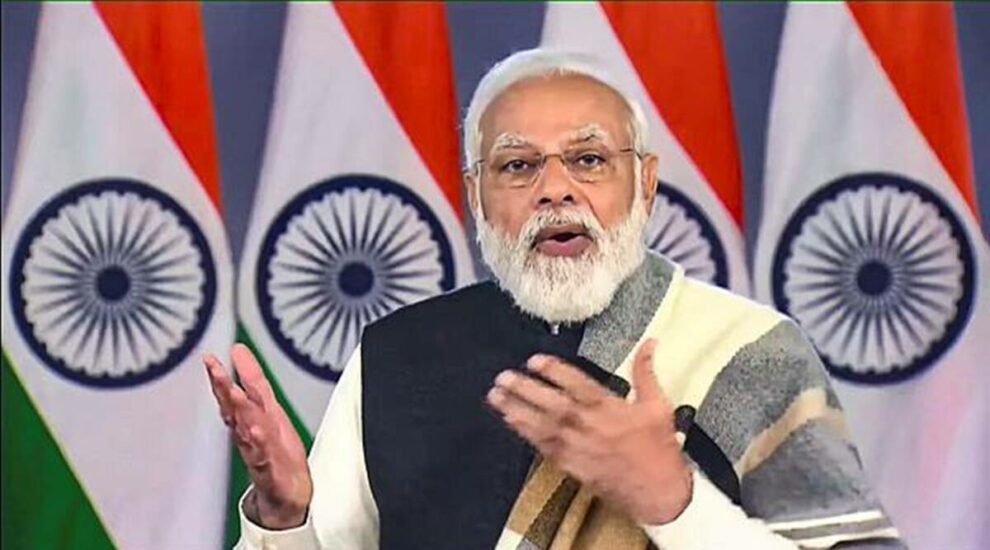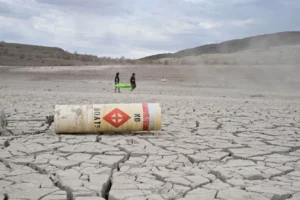Prime Minister Narendra Modi on Thursday said that the business potential for India’s private sector in solar, wind and biogas energy is akin to that in a gold mine or an oilfield, and stressed that renewable energy sources could generate a huge number of green jobs in the years to come.
Modi was addressing stakeholders, including prominent industrialists, experts and state government officials, during a post-Budget webinar focused on Green Growth – the first in a series of such 12 post-Budget events being organised by the government for effective implementation of the initiatives announced in the Union Budget 2023.
“The potential of segments like solar, wind energy, and biogas in India is no less than any gold mine or oil field for our private sector,” Modi said.
The Prime Minister also called for global investments in India’s green energy sector.
“India’s commanding position in renewable energy generation can help energy transition globally. This year’s Budget will help India establish itself as a lead player in the global green energy market. That is why today I am inviting all major stakeholders from the energy world to invest in India. The world is diversifying its renewable energy supply chains. Through this Budget, I want to attract green investors to look at the opportunities in India. The Budget will also help start-ups in the green energy sector,” Modi said.
He pointed to India emerging as one of the fastest-growing major economies on the renewable energy front. “Our track record shows that when we set a renewable energy target for ourselves, we achieve it in advance. In our total installed electricity capacity, more than 40% is from non-fossil fuel sources which we achieved nine years in advance of our committed timeline,” he said.
India started a phased roll-out of E20 fuel on February 6. This is a blend of 20% ethanol and 80% fossil-based fuel. The country increased the proportion of ethanol in blended petrol from 1.53% in 2013-14 to 10.17% in 2022, and is now targeting achieving 20% blending by 2025-26.
Modi said that India is focused on achieving a green transition in the country, which is apparent in the Union budgets presented 2014 onwards.
“India’s budgets from 2014 onwards have a distinct pattern. The pattern is that our government has dealt with challenges of the present but also provided solutions for the future and new age reforms. For green growth and energy transition, India has a three-pronged strategy – increasing the generation of renewable energy, reducing fossil fuel usage in the economy, and moving rapidly towards a gas-based economy,” Modi said.
He mentioned schemes such as PM Kusum (to enable farmers to set up solar power generation capacity for irrigation), and solar power initiatives mentioned in Union budgets over the last few years, and said the 2023-24 Budget had taken the push a step further.
“This year, we have even provided a scheme of green credits for the industry; PM Pranam for farmers; Gobardhan scheme for villages and vehicle scrapping policy for urban areas. From green hydrogen to wetlands, the Budget covers the entire gamut. The focus on green growth in this Budget is mainly keeping in mind the security and prosperity of our future generation,” Modi said.
During her Budget speech, finance minister Nirmala Sitharaman listed “green growth” as one of the four opportunities that can be transformative for India in the run up to 2047, the country’s 100th year of Independence. The other three were the economic empowerment of women, integrating traditional artisans with the MSME sector, and tourism.
The Budget provided ₹35,000 crore for priority capital investments towards net zero transition and energy security by the ministry of petroleum and natural gas.
India formally updated its nationally determined contribution (NDC) to fight the climate crisis, confirming to the United Nations Framework Convention on Climate Change last August that it will reduce the emissions intensity of its Gross Domestic Product (GDP) by 45% from 2005 levels by the year 2030, and source about 50% of its energy requirement from non-fossil fuel-based sources by the same deadline. India also underlined that its NDC would help achieve the long-term goal of reaching net-zero emissions by 2070.
“The Budget will lead to significant job creation through the green economy. Support to various sectors like green hydrogen, bio-manure, offgrid solar and storage among others will create economic opportunities for entrepreneurs and job seekers. Interestingly, the budget has specifically allocated a significant amount for evacuation and grid integration infrastructure for harnessing the renewable energy potential for Ladakh. We can expect this to spur the economic development of this region ,” Vaibhav Chaturvedi, Fellow, Council on Energy, Environment and Water (CEEW) had said on February 1 following the union budget.
Source: Hindustan Times











Add Comment